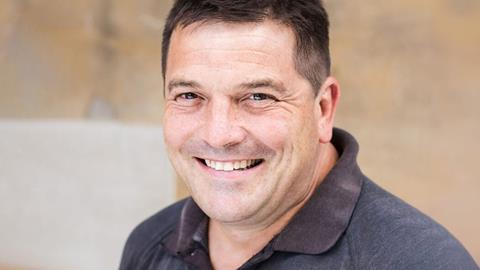The Christianity Explored founder opens up about his psychological wounds, the reason he exited the Church of England and why, when it comes to equipping the Church for evangelism, he’s more confident than ever
Rico Tice believes we’re experiencing a crisis of Christian leadership.
The founder of Christianity Explored ministries gives me two reasons why this might be the case.
Firstly, Tice is concerned that, because some of his fellow leaders haven’t sought healing from past traumas, this could lead to further abuse. As the popular saying goes, “hurt people hurt people”. This is something Tice has come to understand in his own life thanks to a psychologist who helped him unpack the bullying he experienced at one of the nation’s most prestigious boarding schools.
Secondly, the evangelist is troubled by cancel culture. He says a lack of grace and forgiveness in our society is dissuading Christians from taking on leadership positions. He even cites one example of a vicar whom, Tice says, was “persecuted” by his own congregation.
These are interesting observations from the 58-year-old, not least because in our increasingly polarised times, it’s rare to hear both comments – one concerned with mental health, the other with cancel culture - coming from the same person.
Tice is refreshingly candid. There’s no need to cajole or drag information out of him. I admit we did turn the heat up on him (not deliberately – the air conditioning inside Premier’s studio happens to be broken), but Tice seems remarkably comfortable. He’s self-aware too - remarking at one point, with a slight twinkle in his eye: “this might sound arrogant, but what do you expect from a public schoolboy?”
It turns out Tice isn’t arrogant at all. He might stand on stages around the world and preach the gospel to hundreds (he did this, superbly, at the memorial service for Premier’s late CEO just a few days ago). But projecting confidence from a platform is not the same as feeling it deep down. Many of us live with imposter syndrome, and as we wrap up the interview he wants to know: “Was that OK?”
In a time when so much trust has been damaged or broken between those in the pews and their leaders (see this week’s headlines) I find his humility and honesty on difficult topics refreshing. During our hour together we delve into his own fascinating story, discuss what Christians should make of Russell Brand’s reported conversion and unpack why the Church of England’s position on sexuality resulted in the evangelist leaving the church he loved.
How did you become a Christian?
I think conversion is waking up, and I woke up to my mortality in 1982 when my dad’s older brother - my godfather - was killed in a cliff fall.
I remember thinking: I’m going to die too. I’m not here for long. No one in my family had an answer to death, it was a taboo subject. But a maths teacher at school, Christopher Ash, said to me: “When Jesus got through death, he got through death to get you through.” I remember thinking: If that is true, it’s the most important thing in the world.
You were at Sherborne in Dorset, one of the oldest schools in the country. It’s a boarding school and is a member of the Eton Group. What are your memories of it?
It was unrelenting. I suppose I’m grateful for that, because it taught a resilience, but it was tough.
The environment was quite Darwinian. You denied weakness in yourself and exploited it in other people. There was a lot of bullying.
When I came to Jesus, it was war. I wasn’t expecting such a massive spiritual battle.
What happened?
I’ve got here one of the magazines that my fellow students produced. It was bullying, really. These magazines would come out each month. Let me read you some of it. This is what I was facing when I was 17 years old: “Christianity, you’ll find Rico, is just a phase you’re going through. Don’t let other people get caught up in your whirlpool of religious fantasy”, “Praise the Lord Allelujah? No. Just f*** off.”
[Rico leafs through pages of “articles” designed to mock and bully him for his newfound Christian faith]. This is the prayer at the end of the magazine: ”Dear Lord, we at lordy, lordy, plea for forgiveness in order that our sins may be remitted…We’re still adamant in agreeing that Rico is a senseless jerk. Amen.”
I would walk into the school dining room knowing that all the boys had read that.
But what made it so difficult was that I didn’t yet understand my identity in the gospel. I didn’t yet understand that, whether you accept or reject me, Christ loves me to the core, and he died for me. Therefore, I was just fearful all the time.
I had to do some work with a psychiatrist in my late 30s. I had a broken engagement that was my fault. I had to unpack that and the effect of that magazine.
I think we’ve got a bit of a crisis of Christian leadership at the moment in the country. If you don’t do the work on your bruising, you can then feed on the sheep. The devil will exploit our weaknesses much more if we’re not aware of them, don’t have accountability and a safe place to talk them through.
You’ve got to be able to go: “Ah, that magazine was written when I was 17. That put some unexploded bombs in my head. I know how they go off.” With Lucy, my wife, on our first or second date, I did a little map of my head for her, which enabled her to know what was going on. But the disaster with Christian leaders is when they aren’t self-aware. They don’t know what their wounds are.
I think that’s what has worried me more about some of these boarding schoolboys who are in Christian leadership - I think they have the view that “real men don’t get help”. That’s a problem. We’re all broken. You just have to be self-aware, otherwise these things come out in other ways, and that that can be toxic.
It’s sadly, a very common story of those who go to boarding schools and later say it has been deeply psychologically damaging – for all sorts of reasons.
Yes, that’s right. I’m very grateful for my parents. They were trying to do the best for me. But I went at eight years old, and of course, if you’re bullied, you can’t run and hide. So you emotionally shut down.
You realise that love is conditional in that environment. You’re only loved if you succeed.
So three things [were put down] in my subconscious: Tice, you’re not good enough. Prove yourself. It’s a dangerous world.
You’re not good enough? Well, the wonderful thing is, when I heard the gospel at 16 [I learned that] no, I’m not, but Christ died for me. Prove yourself? Actually, I don’t have to. I live by his performance, not mine. It’s a dangerous world? Yes, it is, but Romans 8:28 is true. All things work together for my good. What is my good? That I’ll grow more like Christ. And therefore, today’s a great day, because today’s the day God has planned.
You said there’s a crisis of Christian leadership. Why is that?
I think one of the reasons fewer people are going into ministry is that, if you get something wrong now, there’s a very unforgiving cancel culture. And I want to say to those reading this, put your arms around your pastors and protect them. We need to help them to grow, not just line them up for a firing squad.
I’m worried by boarding schoolboys who are now in Christian ministry and think “real men don’t get help”. That’s a problem
How have pastors gone from being respected to being “lined up for a firing squad”?
Well, the good thing is that we’ve understood the post-modern narrative around power and how it works. There was a lot of soft power that pastors had and I think now, with media and with everyone needing a voice - particularly with minorities needing a voice - we’ve grown up a bit.
But a pastor does need some authority. They do need to be able to teach the word of God and say: “This is the direction we’re going in.” People see everything as a power play now. While we need to understand that pastors need correcting, the other side of it is that, when they make a mistake, we don’t just shoot them.
I’ve got a dear friend who was a minister in a place in England. And honestly, I know him well. He is a very godly man, and I thought he was just taken out and shot by the church family. There are others where I’m thinking, No, there was a huge issue there. It had to be faced. But this chap, actually, I think they just disagreed theologically with where he stood and they weaponised the safeguarding procedures to take him out of ministry and after two years of persecution he was out.
People’s voices need to be heard, and we need to be accountable. With Ravi Zacharias, his board was his family and he wasn’t going to a local church. I mean, that’s madness! Those basic things have got to be in place, and we’ve got to ask if they are in place.
You recently left the Church of England over sexuality. Was that a difficult decision?
I’m a lifelong Church of England guy. The agonising issue that I faced was not that I was leaving the Church of England, but the leadership of the Church of England was leaving me.
If you run a parachurch organisation, which I do, your key job is to get materials out to Christians around the world. In order for that to happen, the gatekeepers from the different organisations have to trust you. If you’ve got a leadership that are denying the need for repentance and are changing historic Christianity, that means you lose the confidence of the people you’re wanting to take this format of Mark’s Gospel to, because they’re just going to go: “Well, Rico’s still in the Church of England, and if he is, that means he can’t understand repentance, because that church has now said there’s certain sins you don’t have to repent of.”
Many leaders in the Church of England would deny that, and say they still hold to the need to repent and turn from sin.
They are saying to people who are in same sex relationships: “We will bless those relationships.” But the Bible’s teaching is clear, and I stand with 65 million Anglicans around the world, and historic Christianity, in saying the only place for sex is between a man and woman within marriage.
That’s a hard one to say, but nevertheless it is what it means to be faithful biblically. If you stop saying that, you stop preaching Christ as Lord, because you’re saying actually he’s not Lord in certain areas.
This is not a secondary issue. This is absolutely primary, because it’s whether Christ is Lord of our bodies or not.
Were you ever able, in the process of working through this decision, to speak to senior people in the Church of England and say, “I’m reluctant to leave, but I feel like your decisions are forcing me to”?
An excellent point. And can I say to anyone, when it comes to disagreement, we must follow a process. I wrote to every bishop in the Church of England. I wrote to the Archbishop of Canterbury and the Archbishop of York. And I did this before the bishops passed the legislation to say, we will write these prayers of blessing. So please don’t think it was flouncing out suddenly, it was a two or three year process.
Did you get a response?
At each point they said: “the Church of England believes everyone must flourish, and therefore we’ve got to accommodate various views.” I said: “No, we only flourish under the Word of God. I made vows when I got ordained in 1994. You’re now asking me to go against those vows.”
In my naivety, I always thought the Church of England would be a broad church in which we would have our eccentrics but, basically, we would hold to the doctrinal faith that had been passed down to us. That is not happening.
Are you optimistic or pessimistic when it comes to the state of the culture in the UK today and how receptive people are to hearing the gospel?
I’ve never felt more confident. As my friend Glen Scrivener has said, the tide has gone out in culture, and there are bodies left on the beach.
15 or 20 years ago, we were just seen as intolerant bigots. Now, because of the pain that the 1960s sexual revolution has yielded for so many people, we’ve actually got much more confidence.
For example, Louise Perry’s book, The case against the sexual revolution. She’s not a Christian, but one of the things she’s saying is, marriage is great, but so many young women can’t find people to marry. And the reason she says that is the same as what Vaughan Roberts said to me: “Rico, unless there’s one rule, there are no rules.” We’re in a culture where there are no rules, and that is terrible for young women, because [men] will sleep with them, but not marry them. A lot of young men don’t understand what it means to be a husband and father.
I don’t say this with any joy. I’m absolutely gutted by the pain there is relationally. But for the first time in 60 years, people are seeing it. So I feel much more confident now, knowing that Jesus is the rock, because the world is being proved to be sinking sand.
Speaking of the sexual revolution, what do you make of the apparent conversion of Russell Brand? Should we celebrate he’s professing Christ, or be very cautious given the serious sexual misconduct allegations against him?
You really do have to wait and help people to be grounded before you give them a public voice.

I am encouraged by Russell Brand, but the Parable of the Sower tells me that the word can get plucked away. The seed can spring up, but then wilt. The thorns and thistles of this life can strangle. As I’ve watched Russell Brand, I have prayed for him. I have longed for him just to quietly be in a local church while we get him grounded in discipleship.
God bless him, but he’s got so much work to do in terms of learning the basics of discipleship. If he was in my church, I’d say: “No, you’re not having the microphone, my dear friend, you’re on the tea rota, and we’re going to do this for three or four years and get you absolutely solid. Because before we go out publicly, we’ve got to be living it privately.”
To hear the full interview listen to Premier Christian Radio at 8pm on 7 December, or download The Profile podcast
Hear Rico preach regularly on Premier’s brand-new podcast ‘The Bible Explored with Rico Tice’. Available now on premier.plus, or wherever you get your podcasts from. The show is also broadcast on Premier Christian Radio every Monday at 1pm and 10pm
Postscript: This interview with Rico Tice was conducted on 22 October. Two weeks later, the Makin review was published, which detailed “prolific and abhorrent” abuse committed by John Smyth. Accusations of a church cover up cullimated in the resignation of the Archbishop of Canterbury, Justin Welby and there have been continued calls for other church leaders to consider their positions. The Makin report says Rico Tice was told of the abuse by Peter Krakenberger in 1987. In a statement published on 22 November, Tice said, ”At that time [1987], I was not aware of the dreadful severity of those beatings, certainly not that they amounted to criminal assault. However, I could see that it was profoundly wrong and so I made my concerns known soon afterwards…I had reported what I knew to senior people in the Iwerne camp hierarchy more than once. In 2017, when the Channel 4 documentary about John Smyth aired, I contacted the Archbishop of Canterbury’s office to repeat again what I knew.”






































4 Readers' comments